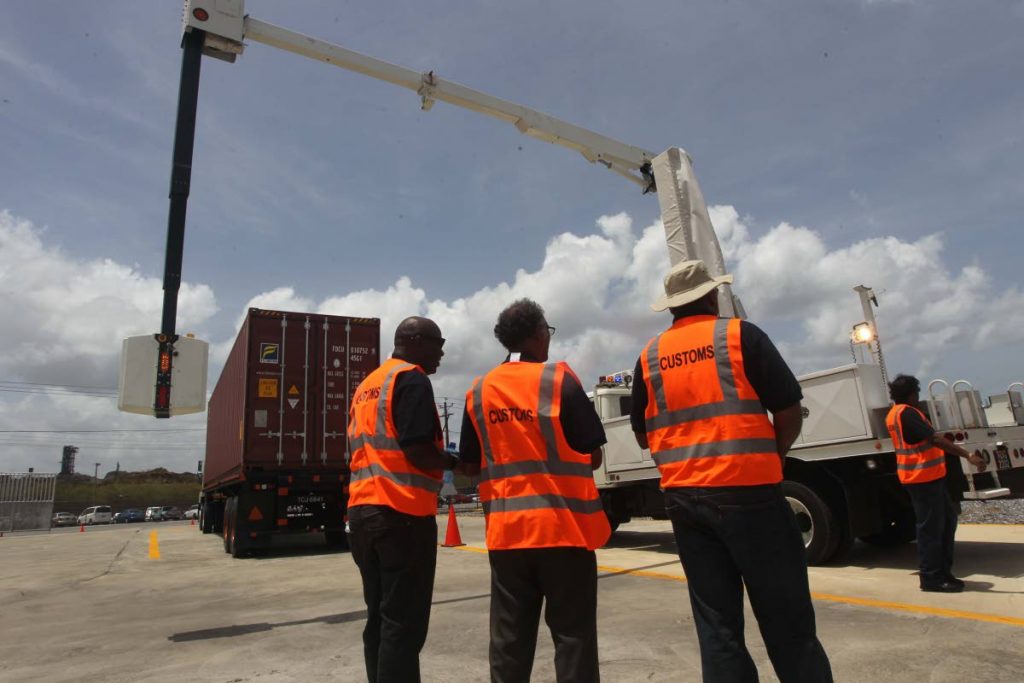Border security

The US Customs and Border Protection's recent donation of four mobile vehicle and cargo inspection system (VACIS) scanners was described by acting Comptroller of Customs and Excise Kathy Ann Matthews as a significant development in the border management capacity at the Customs and Excise Division.
The four mobile scanner units, two of which were unveiled at the Port of Point Lisas on April 18, are expected to assist in stopping human trafficking and preventing drugs and other contraband from entering or leaving TT’s ports. The other two mobile scanners are expected to be placed at the Port of Port of Spain.
The VACIS system, which is manufactured by the Leidos Corporation, uses low-dose, dual-energy X-rays to scan trucks, cargo containers, cars and other vehicles. The system scans while stationary or in motion and can even scan occupied vehicles.
Detailed, colour-coded images help inspectors locate weapons, explosives, drugs, undeclared cargo and other contraband.
The system, which is mounted on a rugged truck chassis, scans the entire target vehicle bumper-to-bumper, all the way down to the axles and can also be configured to scan just the cargo, not the driver cab.
According to the Leidos website, the system can operate as a stationary portal and can scan “150 vehicles per hour or more, scanning automatically as they drive through without stopping. Scanning in motion, the system can scan 60 stationary vehicles per hour or more.”
The low dose X-ray system penetrates all but the densest cargo using a very low radiation dose while its colour-coded images distinguish organic materials such as explosives and drugs from inorganic materials such as guns and shielded objects.
Finance Minister and acting Prime Minister, Colm Imbert, who delivered the feature address, said Leidos has been contracted to provide installation, training, maintenance and technical support to the Customs and Excise Division.
“The Government’s investment in this initiative is indicative of its deep commitment to border security and trade facilitation and supports the efforts of the hard working customs personnel in achieving the division’s mission,” he said.
He said the initial operator training and maintenance operations totalled US$2,449,662 (TT$16.6 million) and the present three-year comprehensive maintenance contract which took effect from October 1, 2017 and which includes further operator and image analysis training is valued at US$1,467,895 (TT$9.9 million).
“The mobile units provide flexibility and due to their versatility and small footprint requirements, these mobile scanners can be used at other locations for special operations. They will serve as an effective tool in assisting the government in providing added security to the citizens of TT. Customs and excise officers and guards have been trained in operating these mobile scanners and stand ready to carry out these functions efficiently and effectively,” he said.
He said securing the supply chain, which included the maritime trade, is a major concern for all countries and with the continuous growth in international trade, there was an urgent need for TT to increase its border security capacity.
He said violent crime, fuelled by illegal drugs and weapons, has had a “deleterious effect” on TT affecting citizens as well as businesses.
Imbert said the scanners would also assist in revenue collection as customs officers would be able to verify manifests to mitigate duty and tax fraud, as well as detect undeclared cargo for the collection of duties.
The scanners would also accelerate inspection and the faster delivery times of goods as verification of the contents of containers could be done in a more efficient manner.
Meanwhile Matthews, in her remarks, observed that international trade is an “essential driver” of economic prosperity and any threat to the global trading system would severely damage the global economy.
“The Customs and Excise Division views the implementation of these scanners as critical and indeed timely as we have seen the increase of illegal activity and the importation of contraband via the use of containers. The mobile scanners will be very effective in the detecting of contraband intended for import, export or transport,” she said.
Plipdeco chairman Ian Atherly said some of the increased security measures at the Point Lisas port includes the positioning of 200 CCTV cameras at strategic locations at the port, warehouses and industrial estates.
He said some of the cameras have already been integrated in the Ministry of National Security infrastructure and Plipdeco was also actively exploring the installation of GPS tracking technology on the port operating equipment.
Also delivering remarks was US Charge d'Affaires John W McIntyre who said the donation of the mobile scanners was “testimony to the strong ongoing partnership" between the US and TT.
“Our commitment to this country is ongoing, is outstanding for our strategic partner, it has not changed,” he said.
He said the scanners would directly assist in the reduction of illicit trafficking of narcotics, weapons and people, as well as combat terrorism.
“When it comes to security, both the US and TT face daily challenges, we want to be secure in that order. This technology puts us in a better place to combat challenging issues such as terrorism and human trafficking while continuing to grow our partnerships," he said.

Comments
"Border security"